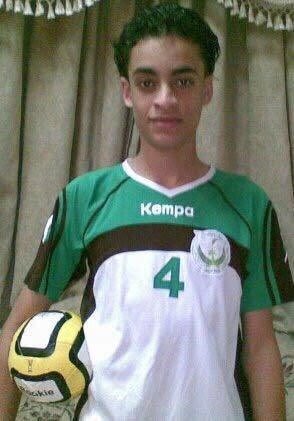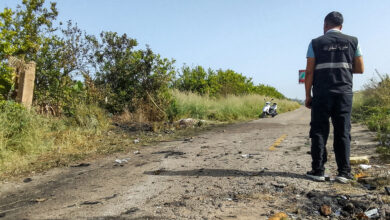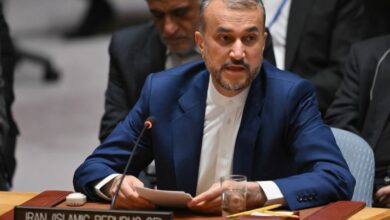
Beirut, Lebanon (CNN)–Long before Saudi Arabia announced it had carried out one of the largest mass executions in its history earlier this week, some of the men condemned to death had made impassioned pleas to the courts in a bid to save their lives.
Many said they were totally innocent, that their confessions had been written by the same people who had tortured them. Some claimed to have evidence of their abuse at the hands of their interrogators. And one reaffirmed loyalty to King Salman and his son, Mohammed bin Salman, in hopes of getting leniency from the court, trial documents show.
None of these arguments swayed the judges overseeing their trials in 2016, and the suspects were convicted of terror-related crimes and sentenced to death. On Tuesday, Riyadh announced that 37 men had been executed, including three who were minors when the kingdom said they carried out their crimes. One of the men was crucified after his execution, strung up and put on display as a warning to others.
The youngest of the executed men was Abdulkareem al-Hawaj, according to Amnesty International. He was charged with participating in violent protests at the age of 16, and his death sentence sparked an outcry from the United Nations, which had urged the kingdom to overturn the ruling.
Another was Mujtaba al-Sweikat, who was 17 when he took part in demonstrations that would lead to his arrest in 2012. He was detained at an airport in Dammam as he was preparing to board a plane to the United States, where he was set to enroll at Western Michigan University.
CNN has obtained hundreds of pages of documents from three 2016 trials involving 25 of the men whose executions were announced this week. Eleven were found guilty of spying on behalf of Iran, the country’s regional nemesis. Another 14 were convicted of forming a “terror cell” during anti-government protests in the largely Shia city of Awamiya in 2011 and 2012. Most of them were from the country’s much-maligned Shia minority.
For the authorities, the trial of those involved in the Awamiya protests was an open and shut case — the men had confessed, and “justice was served,” in the words of one Saudi official to CNN on Tuesday. When the United Nations raised concerns in 2017 that torture had been used to obtain the confessions in that case, the Saudi government responded with a letter denying the claims and stating that the men had stood by their admissions of guilt in court.
But the documents obtained by CNN show that far from owning up to their confessions, some of the men in the Awamiya case repeatedly told the court that the admissions were false and had been obtained through torture. In some cases, the suspects said they had provided nothing more than their thumbprints to sign off on confessions which they claimed had been written by their torturers.
“Those aren’t my words,” said one of the accused, Munir al-Adam, during the trial, according to the documents. “I didn’t write a letter. This is defamation written by the interrogator with his own hand.”
The 27-year-old, who was partially blind and deaf, was named as one of the men executed on Tuesday.
The Saudi government did not immediately respond to several requests for comment on the allegations of torture and forced confessions laid out in the court documents.
In a statement about the executions, a Saudi official told CNN Tuesday: “The Kingdom of Saudi Arabia has long ago adopted a zero-tolerance policy towards terrorists who spill the blood of the innocent, threaten the national security of the kingdom and distort our great faith. The convicted criminals who were executed today had their day in court and were found guilty of very serious crimes.”
‘Sowing unrest’
Most of the prisoners who were executed were members of the kingdom’s minority Shia community, which has long protested against the political and economic marginalization of the religious group.
Several of the cases involving those who were executed center on Awamiya, the Shia city in the country’s Eastern Province, where Arab Spring protests took root in 2011. Awamiya was the hometown of prominent Shia cleric Sheikh Nimr al-Nimr, who was a leading figure in the province before he was executed by the Saudi government in 2016.
In one of the cases, 24 men were put on trial for alleged crimes related to the protests. Fourteen of them were charged with joining a terror cell, according to a UN report on the case. Those 14 men were on the list of the 37 executions announced Tuesday.
The prosecution of the men relied heavily on confessions, according to the court documents seen by CNN, and the 14 men charged with joining a terror cell denied the charges.
Put together, the confessions attributed to those 14 men paint a detailed picture of a group of young activists who closely coordinated riots, organized anti-government propaganda, and were sometimes engaged in sexual relations with one another.
One of the executed men admitted to having sex with four of the other men on trial, according to a confession presented to the court. His sexual relations featured twice in the published statements, mixed in with details about anti-government violence. Homosexuality is illegal in Saudi Arabia, which adheres to a strict interpretation of Sharia law.
“He said that he did all this because he belonged to the Shia sect and because he was against the Sunni sect, and because of his hate for the state and its men and its security forces,” the court report said. The man denied the charges against him, and his lawyer said the interrogator “invented” the confession.
Another executed prisoner, Hussein Mohammed al-Musallam, told the court that he suffered from multiple injuries, including a broken nose, collarbone and leg.
“Nothing in these confessions is correct and I cannot prove that I was forced to do it,” said Musallam, according to documents. “But there are medical reports from the prison hospital of Dammam and I ask your honor to summon them. They show the effects of torture on my body.”
‘Forced to sign so the torture would stop’
The entire case against student Mujtaba al-Sweikat was designed to “create the illusion of a terror cell” where there wasn’t one, his father argued in court.
“Only few of the 24 men committed real crimes,” said Nader al-Sweikat, who acted as his son’s attorney during the mass trial, according to the court documents.
In defending his son, Nader al-Sweikat tried to paint the picture of a patriotic family who was loyal to the kingdom, and of a diligent, well-behaved boy who finished his final official exams in Saudi Arabia with a 94% average score.
But instead of pursuing his dreams in Michigan, Mujtaba al-Sweikat would be arrested in 2012 and put in a solitary confinement cell for 90 days, according to his father’s statement.
The court documents said Sweikat confessed to throwing Molotov cocktails at security forces and running a chat group on his Blackberry phone that helped to organize the demonstrations. His father claimed that his son only twice joined the demonstrations and for five minutes each time.
“He was subjected to psychological and physical abuse which drained his strength,” Sweikat’s father said in a statement carried by the judgment sheet. “The interrogator dictated the confession to Sweikat and forced him to sign it so that the torture would stop. He signed it.”
In the end, Mujtaba al-Sweikat too was found guilty and sentenced to death.
According to Amnesty International and some Saudi activists, families were not informed in advance of the executions, and were shocked when they received the news that their long-detained loved ones had been killed.
None of the families appear to have commented publicly since the executions were announced. Saudi authorities have cited contact with foreign journalists as evidence in other criminal cases.
A US State Department official expressed concern over the executions on Tuesday.
“We have seen these reports. We urge the government of Saudi Arabia, and all governments, to ensure trial guarantees, freedom from arbitrary and extrajudicial detention, transparency, rule of law, and freedom of religion and belief,” the official told CNN.
Executions part of a wider crackdown
Saudi Arabia has one of the highest death penalty rates in the world. It previously carried out a mass execution of 47 people in January 2016, including Nimr al-Nimr, the Shia cleric. The executed prisoners were accused of terrorism and having extremist ideology.
Saudi Crown Prince Mohammed bin Salman has overseen an intensified crackdown on dissent since he first emerged on the kingdom’s political scene in 2015. In recent years, he has also ordered the rounding up of high-profile businessmen and princes, along with women’s rights defenders who were allegedly tortured and whom authorities accuse of “suspicious contact” with foreign entities. The government has repeatedly denied the torture claims.
The kingdom has also struggled to contain the fallout from the murder of Jamal Khashoggi at the Saudi consulate in Turkey last October. The CIA has concluded that bin Salman ordered the killing of the journalist, though Riyadh has denied the claim.
News of the mass executions came on the eve of a major business conference in Riyadh, but it didn’t stop some of the biggest names in banking and finance from attending. BlackRock CEO Larry Fink, HSBC CEO John Flint and JPMorgan’s Chief Operating Officer Daniel Pinto all appeared on stage Wednesday at the event organized by the Saudi government.
None of the finance executives were asked about human rights on the conference stage. JPMorgan and Morgan Stanley declined to comment. HSBC and BlackRock did not immediately respond to a request for comment.
By Tamara Qiblawi and Ghazi Balkiz, CNN




